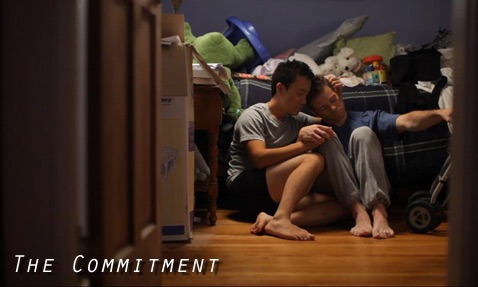
Interviews | Local Industry | Massachusetts
7 Fluid Oz in 10 Fluid Years
Written by Dave Walker | Posted by: NewEnglandFilm.com
In 2001, brothers Seth and Aaron Howland founded 7 Fluid Oz. Productions with the hope that it might ride the wave of the nascent film industry in Massachusetts. In the ten years since then, they have remained at the forefront of the independent film community that continues to grow in Boston, churning out a variety of projects from shorts and features to corporate and non-profit videos to live concert DVDs and music videos. I recently spoke with them about their ten year run, the insight they’ve drawn from it and their film The Commitment, which is currently in post-production.
Dave Walker: Ten years is a long time, especially in a competitive industry that’s primarily dominated by bigger studios in New York and LA. What do you think distinguishes your production services?
Aaron Howland: I think one of the things that distinguishes our production services is our commitment to hiring the right team for each production. On an indie film set, where there’s never enough time and money, one toxic personality can cripple a project that’s been months or years in the making. Finding a team that can work well together — that can work well under pressure — is essential to an indie film’s success.
While we obviously need to worry about income, we value our ability to make decisions based at least as much on principle as on financial concerns. If we had to answer to investors or stockholders, I think we’d be miserable.
DW: As brothers, how has it been working with one another? Do you think you make a good team?
Seth: Some people are surprised when they learn we are brothers and can work together. I am close to all my siblings so working with Aaron is easy. We also compliment each other very well. What ever our weaknesses are, the other seems to have that as a strength. It works out perfectly.
Aaron: We tend to have the same beliefs about what makes a film successful, how to go about planning a production, and how to interact with the cast and crew. What makes me happiest, though, is the fact that we have different strengths and weaknesses, so when we’re on a set, we’re not competing. We’re working together to make sure that every aspect of the production is on track.
DW: Over the years, you guys have produced dozens of films and videos — feature films, short films, corporate videos, documentaries, music videos and live concert videos. You have collected four prizes at festivals around the country and some of your work has been featured on CNN, MSNBC and Entertainment Tonight. Of all your accomplishments, which are you the most proud of?
Aaron: There are certain projects I’m more proud of than others, but more than anything, I’m proud of being respected by other members of the Boston film community. Whenever we work with a cast and crew, our aim is to make the best product we can, but not at the cost of burning bridges with our team members.
Seth: By far, The Albino Code. It was the toughest pre-production just because of logistical issues so it was very rewarding when we wrapped shooting. Dennis Hurley, who met with us about producing and directing it, was a pleasure to work with from the first meeting. He is an immense writing and acting talent and we became friends from that production. I have worked with him on many projects since. Also, on a personal note, somewhere in the ridiculous, sleep deprived two weeks leading up to the shoot I ended up with the woman I am going to marry. On many levels, this was the best project we have done.
DW: What are some of the biggest financial challenges that you’ve faced?
Seth Howland: Like most industries the poor economy is a challenge. We recently lost a regular shoot after a merger because everyone is reducing costs. It’s not easy but it’s important to keep going after jobs and keep up with contacts because they do pay off.
DW: Based on your success, what advice might you give to someone that is trying to break into the business of film production?
Aaron: If I had to give one piece of advice to a new filmmaker, it would be to keep in mind that film production, like a lot of jobs, is mostly paperwork. When you’re in pre-production, most of your time is filled with contracts, release forms, permits, insurance certificates, budgets, and schedules. The fun parts of pre-production are working on the script, casting the movie, and location scouting, but none of those things will mean anything if you don’t take care of the practical aspects of your production. Successful filmmaking is all about preparation.
Seth: If you commit to this as a business like us, you should plan long term. You have to put capital into your business and you need to be realistic that paydays are at irregular intervals. Be smart financially for the year. Make sure you can pay your bills and your taxes before spending money on the assumption regular work will be coming. You will go through dry patches and, like this past summer, you’ll wonder how you have two short film shoots so close together.
The biggest thing is put aside your tax money immediately, whether it is sales tax or business/self employment taxes. To quote Bill Cosby in the pilot of The Cosby Show: “The government comes for the regular people first!”
DW: Can you tell me a little about The Commitment, 7 Fluid Oz’s most recent film?
Aaron: The Commitment is a short film about an interracial gay couple’s experience trying to adopt a child. I think what makes Albert M. Chan’s script work is that he focused on the characters and the story instead of turning the film into a public service announcement. Whenever you work on a project that tackles a social issue, it’s important to make the plot and characters convincing. Otherwise the audience feels as if you’re hitting them over the head with your beliefs, and most people don’t respond well to that, even when they agree with your position.
DW: 7 Fluid Oz. has partnered with Albert Chan before. Fate Scores (2009), your previous collaboration with him, enjoyed a successful run on the festival circuit, bringing in the Rising Star Award from the Canada International Film Festival and 3rd Prize for Best Canadian Short at the Vancouver Asian Film Festival. Can you tell me a little about that film and why you think it was successful?
Aaron: I had a great time working on Fate Scores, and Albert did an excellent job as a first time director. As enjoyable an experience as it was though, I had no idea if the film would find any success. It’s a twelve-minute silent film, which is unusual these days, and you never quite know how festivals will respond to your work. We ended up getting selected for eight festivals, the film received two awards, and a Canadian distributor picked it up for DVD release, so I was very happy with the result. I think what made the film successful is that it’s so character-oriented. Each character is unique and interesting, and the actors conveyed their characters so well without using any dialogue.
DW: Do you have any big projects or plans on the horizon?
Aaron: We’re looking forward to another short film with Albert M. Chan, called Descendants of the Past, Ancestors of the Future. In particular, I’m excited about the possibility of shooting the movie on film instead of video. Digital video has made filmmaking more possible for independent filmmakers, but there’s nothing like the aesthetic of film.
DW: How are you celebrating your ten year anniversary? Do you have anything special planned?
Aaron: We’re not throwing a party or anything, but it just so happens that we saved up enough money to invest in a new editing system this year. We built it by hand with our friend John Baycroft, and it has Avid Media Composer and Adobe Creative Suite Production Premium.
Seth: I’ve been so busy the last couple of years… it didn’t occur to me. I knew it was ten years but it didn’t resonate until Albert Chan reposted a story about it on Facebook. I found that amusing since I have an excellent memory with dates and anniversaries.
DW: You guys are proud of your Boston roots and your involvement in the film community here. What inspires you about this area and the independent film culture that exists here?
Aaron: I love living in the area because there’s so much variety. The city has both modern and historical architecture and a gorgeous skyline, and just outside the city, you can find farms, factories, suburbs, seaports, historical landmarks — whatever you need for your production. I also think people outside the area think of Boston in one way. They think of it as being a white, predominantly Irish city, and that’s not the case. The city itself is only about half white. It’s actually very diverse, and there’s a lot of culture here. I hope that Hollywood films take more advantage of that as they continue to work here.
To find out more about 7 Fluid Oz, visit the company’s website at www.7fluidoz.com, or check out their upcoming films The Commitment and Descendants of the Past, Ancestors of the Future.
To find out more about 7 Fluid Oz, visit the company’s website at www.7fluidoz.com, or check out their upcoming films The Commitment and Descendants of the Past, Ancestors of the Future.









